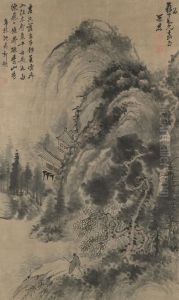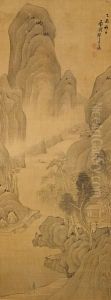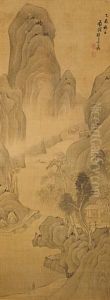Wang Daokun Paintings
Wang Daokun was a notable figure in Chinese history, known for his multifaceted contributions to literature, politics, and art during the Ming Dynasty. Born in 1525 in Zhejiang Province, Wang came from a family with a strong scholarly background, which set the stage for his later achievements in various fields. His life was emblematic of the educated elite of his time, encompassing roles as an official, scholar, poet, and calligrapher.
Wang Daokun's political career was marked by his integrity and the high esteem in which he was held by his contemporaries. He passed the imperial examinations with distinction, which led to various governmental positions. Throughout his career, he was known for his outspoken nature and his willingness to offer frank advice to his superiors, a characteristic that, while earning him respect for his honesty, also led to periods of disfavor and exile from court. Despite these setbacks, Wang's dedication to principled governance and his intellectual contributions remained unwavering.
In the realm of literature and arts, Wang Daokun excelled as a poet and calligrapher. His poetry was celebrated for its elegant style and profound depth, reflecting the complex social and political landscapes of his time. As a calligrapher, he was recognized for his mastery of the art, contributing significantly to the development of script styles and the aesthetic principles of calligraphy during the Ming Dynasty. Wang's artistic legacy is notable for its reflection of his scholarly pursuits and his deep commitment to cultural and ethical values.
Wang Daokun's death in 1593 marked the end of a life that had significantly impacted the intellectual and cultural fabric of late Ming China. His works continued to be studied and admired, influencing subsequent generations of scholars, officials, and artists. Through his contributions to Chinese literature, calligraphy, and public service, Wang Daokun remains a distinguished figure in the rich tapestry of China's historical and cultural heritage.


